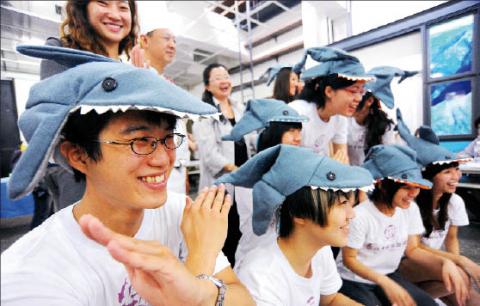As many as 4 million sharks are slaughtered each year to satisfy the nation’s taste for shark fin soup at wedding banquets, animal rights activists said yesterday.
In a survey of 76 international hotels earlier this year, the Environmental and Animal Society of Taiwan (EAST) found that 71 listed shark fin soup on the menu for wedding banquets, among them the Grand Hotel, the Sheraton Taipei Hotel and the Regent Taipei.
Another three said that while they would not voluntarily offer shark fin soup because of the hotels’ environmental protection policy, they would provide the course if customers made a specific request.

Photo: Lo Pei-der, Taipei Times
Two other hotels said they did not offer banquets serving Chinese food.
EAST director Chen Yu-min (陳玉敏) said that based on the quantity of shark fin that is served at the 71 hotels in question, between 920,000 and 3.86 million sharks may be killed each year.
In a presentation, Chen played a video clip showing how fishermen obtain shark fins. After the fins were cut off from the bodies of sharks, which were still alive, they were dumped back into the sea.
“Shark fin soup is a most immoral and eco-unfriendly dish, and it has no benefit to human health at all,” Chen said, adding that society encouraged couples planning to get married to specify that they did not want shark fin soup served at their wedding banquets.
She also said that Taiwan should insist that fishermen who catch sharks bring the entire carcass back to the harbor rather than dumping it into the ocean.
Chef Shih Chien-fa (施建發), also known as Maestro A-fa (阿發師), told the press conference that shark fin required seasoning as it has no flavor.
Shih and other famous local chefs were invited by the Tourism Bureau to make traditional Taiwanese banquet dishes for 1,000 people in Beijing in April.
Shih said he replaced shark fin with cultivated abalone in the traditional banquet dish fotiaoqiang, a type of shark fin soup, adding that nobody complained about the dish losing its original taste.
Shih said members of EAST had contacted him after they saw that shark fin soup would be served in Beijing and it was only after they got in touch with him that he came to understand the cruelty involved in obtaining shark fins.
Other than abalone, the shark fin can be replaced by any fish that contains collagen, Shih said.
Iris Ho (何燕青), campaign manager at Humane Society International, said Palau had turned its sea areas into protection zones for sharks and banned their commercial hunting.
US President Barack Obama also signed the Shark Conservation Act in January requiring that all vessels bring back to land caught sharks with their fins attached.
“Taiwan should draft laws or related measures that better protect sharks,” Ho said.

The first global hotel Keys Selection by the Michelin Guide includes four hotels in Taiwan, Michelin announced yesterday. All four received the “Michelin One Key,” indicating guests are to experience a “very special stay” at any of the locations as the establishments are “a true gem with personality. Service always goes the extra mile, and the hotel provides much more than others in its price range.” Of the four hotels, three are located in Taipei and one in Taichung. In Taipei, the One Key accolades were awarded to the Capella Taipei, Kimpton Da An Taipei and Mandarin Oriental Taipei. Capella Taipei was described by

The Taichung District Court yesterday confirmed its final ruling that the marriage between teenage heir Lai (賴) and a man surnamed Hsia (夏) was legally invalid, preventing Hsia from inheriting Lai’s NT$500 million (US$16.37 million) estate. The court confirmed that Hsia chose not to appeal the civil judgement after the court handed down its ruling in June, making the decision final. In the June ruling, the court said that Lai, 18, and Hsia, 26, showed “no mutual admiration before the marriage” and that their interactions were “distant and unfamiliar.” The judge concluded that the couple lacked the “true intention of

EVA Airways today confirmed the death of a flight attendant on Saturday upon their return to Taiwan and said an internal investigation has been launched, as criticism mounted over a social media post accusing the airline of failing to offer sufficient employee protections. According to the post, the flight attendant complained of feeling sick on board a flight, but was unable to take sick leave or access medical care. The crew member allegedly did not receive assistance from the chief purser, who failed to heed their requests for medical attention or call an ambulance once the flight landed, the post said. As sick

INDUSTRY: Beijing’s latest export measures go beyond targeting the US and would likely affect any country that uses Chinese rare earths or related tech, an academic said Taiwanese industries could face significant disruption from China’s newly tightened export controls on rare earth elements, as much of Taiwan’s supply indirectly depends on Chinese materials processed in Japan, a local expert said yesterday. Kristy Hsu (徐遵慈), director of the Taiwan ASEAN Studies Center at the Chung-Hua Institution for Economic Research, said that China’s latest export measures go far beyond targeting the US and would likely affect any country that uses Chinese rare earths or related technologies. With Japan and Southeast Asian countries among those expected to be hit, Taiwan could feel the impact through its reliance on Japanese-made semi-finished products and